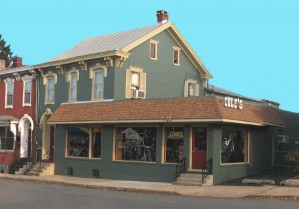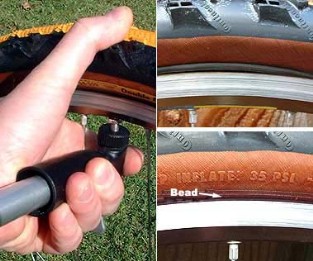Fix a flat - Step 6 - Cole's Bicycles, Inc.






(717) 249-3833
Main menu:
Knowledge > How To: > Fix a Flat
Step 6: Inflate & seat the tire
Not all portable pumps have the power to fully inflate all
tires. But that's okay. You only need enough air to make the tire firm
enough to ride on. If you can't get it hard enough to finish your ride,
find a bike shop or head home to fix it properly.
The first time you fix a flat it may take 30 minutes to an
hour. But, with practice, you'll get much faster. Experienced cyclists
can easily repair one in 10 minutes.
If you ride regularly and haven't fixed a flat yet, practice at home to build your confidence.
Inflate and seat the tire: Place your pump on the valve and inflate the tire. To prevent valve damage, brace it by wrapping a finger behind a spoke (photo left)
so you're pushing against your hand, not the valve. Inflate the tire
until it's just firm (not fully inflated). At this point, inspect the
tire to make sure it's "seated," which means that it's sitting correctly
on the rim.
If the tube gets trapped beneath a bead (photo top), inflating further may blow the tire and tube off the rim! There's a bead line on the side of the tire (photo bottom) that should be equidistant from the rim all the way around on both sides of the tire. If it's not, or if you see a section of tube peeking out from under the rim, let the air out, work the tube back into place, reinflate partway and check the tire again. When it's seated correctly, inflate it fully. Install the valve nut (if your tube uses one) and cap finger tight (overtightening the valve nut can damage the tube and make it difficult to loosen it when you need to fix a flat). Reinstall the wheel in the frame, close the brake quick release or reattach the noodle or cable and you're ready to ride!
Tips
If the tube gets trapped beneath a bead (photo top), inflating further may blow the tire and tube off the rim! There's a bead line on the side of the tire (photo bottom) that should be equidistant from the rim all the way around on both sides of the tire. If it's not, or if you see a section of tube peeking out from under the rim, let the air out, work the tube back into place, reinflate partway and check the tire again. When it's seated correctly, inflate it fully. Install the valve nut (if your tube uses one) and cap finger tight (overtightening the valve nut can damage the tube and make it difficult to loosen it when you need to fix a flat). Reinstall the wheel in the frame, close the brake quick release or reattach the noodle or cable and you're ready to ride!
Tips
Back: Install tire & tube
Back: Start over
Home | About Us | Bicycles & Gear | Service | Events | Specials | Contact / Hours | Knowledge | General Site Map

